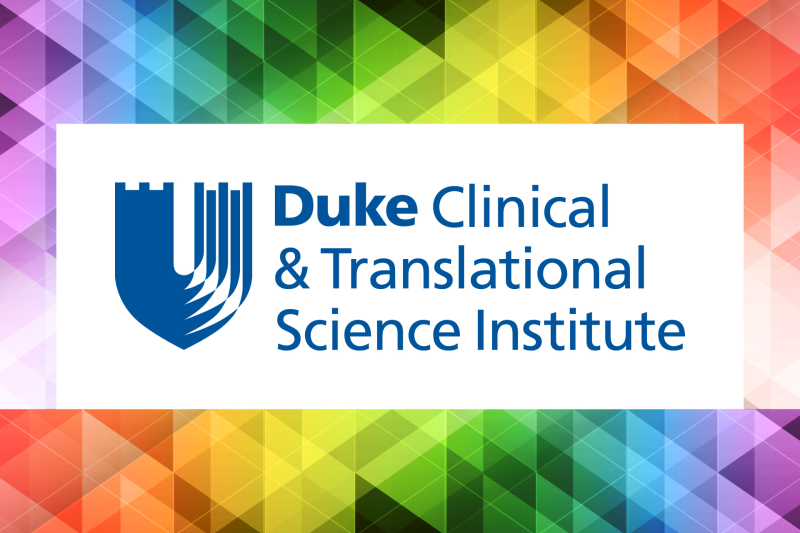
The Duke CTSA TL1 Pre-Doctoral Scholarship program offers clinical and translational research experience and training for predoctoral students in medicine. This year, seven new scholars were selected to join the program. Four of them are Sammy Halpern, Sabrena Myers, Anna Paschall, and Irene Song.
Sammy Halpern
As a scholar in the second year of the Duke Clinical Research Training Program, Sammy Halpern has focused her research on organ transplantation. Specifically, Sammy and her research team have been trying to determine better ways to assess performance in organ donor pursuit and organ procurement, inform transplant communication, and expand the donor pool.
“There is so much we still don’t know about access to transplantation and ways to make organs more available to patients who need them,” she said. “The work is really fascinating, and there is more important work left to do.”
Sammy found out about the TL1 program after she finished her first year of medical school. She thought the program seemed like a good fit for her and would provide an opportunity to build upon her skillset and learn lessons she could apply to her own research questions.
“The scholarship and professional development series can help more students understand how to get from where we are to where we want to be in 5 or 10 years,” Sammy said. “The TL1 program will help give me the practical skills I’m looking for.”
Sabrena Myers
Working alongside Dr. Geeta Swamy and Dr. Sarahn Wheeler, Sabrena Myers's research focuses on physician’s adherence to the USPSTF guidelines for the use of low-dose aspirin for pre-eclampsia prevention and predictors of guideline adherence in nulliparous patients.
“Preterm birth remains a leading cause of prenatal morbidity and mortality,” Sabrena said. “Non-Hispanic Black (NHB) women consistently have PTB rates that are 49% higher compared to other racial/ethnic groups. Preeclampsia accounts for a significant portion of these PTBs. Infants born preterm may face life-long health problems. Low dose aspirin is recommended for preeclampsia prevention; we want to identify barriers to optimal utilization, particularly among NHB women.”
One of Sabrena’s long-term research goal is to work alongside Dr. Wheeler to develop a community-participatory intervention to improve adherence to preterm birth preventive therapies. After hearing from several friends who had completed the TL1 program, she thought it would be a great way to develop the skills necessary to become a successful clinical researcher.
Sabrena’s proposed work will serve as the foundation for a future intervention aimed at improving adherence to low dose aspirin guidelines in pregnancy. “I’m excited that this program allows me to invest two years in developing this project alongside Dr. Swamy and Dr. Wheeler. Also, looking forward to tailoring my second-year classes to reflect further my interest in health disparities and patient-reported outcomes in clinical research.” Sabrena said. “I’m so glad the Clinical Research Training Program leaders wanted to invest in my future as a clinical researcher.”
Anna Paschall
Anna Paschall will been working with Dr. Priya Kishnani in her pediatrics lab researching metabolic and glycogen storage disorders. Anna’s research will focus on identifying genetic and clinical markers of disease progression in patients with a more aggressive subtype of Glycogen Storage Disease IX. This will help determine the disease progression in liver and also will help determine the correct timing of injection of a gene therapy in hopes of improving patient outcomes and quality of life.
“I wanted to work with Dr. Kishnani after seeing her give an awesome lecture in the first year of medical school,” Anna said. “She’s been able to take what she’s learned from her work and give patients back so much quality of life.”
Anna found out about the TL1 program shortly after beginning medical school. She thought the program would be a great opportunity to build on her clinical and translational research skills, especially her statistical analysis skills.
“I’m excited to have a community of other people with similar interests,” Anna said. “It’ll be exciting to build relationships with classmates who are also interested in clinical research.”
Irene Song
Working with Dr. Anthony Kuo, Irene Song’s research in ophthalmology focuses on developing a machine learning algorithm to help identify certain diseases using optical coherence tomography images. Irene has always been interested in translational research, and she hopes her research will help increase utilization of this imaging technology outside of the field.
“I love the intersection of clinical medicine and technology development,” Irene said. “AI and machine learning are becoming important, especially in medicine. I’m excited for the opportunity to work in this burgeoning field.”
Irene heard about the TL1 program through the Third Year Program office at the School of Medicine. She felt the program aligned well with her research interests, and it could be a great opportunity to establish her credentials as a formally trained clinical researcher.
“The courses in research ethics and statistics will serve as a great foundation for my career,” Irene said. “These skills will be really important for my long-term goal of becoming an independent clinician-scientist.”
The CTSA is the NIH’s largest single investment in biomedical research. The awards are given to institutions to create academic homes for translational research. The goal is to address the development and implementation of national standards and best practices for the full range of translational medicine – from discovery science through clinical research and community health.